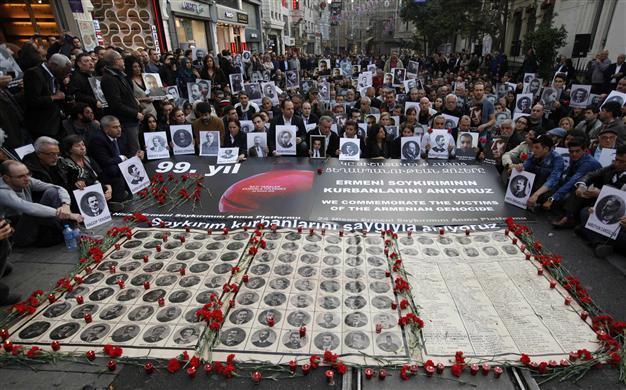Turkish PM Erdoğan’s remarks on 1915 events to pave way for reconciliation, US official says
Verda Özer ISTANBUL / Hürriyet

Activists hold pictures of Armenian victims during a demonstration to commemorate the 1915 mass killing of Armenians, in Istanbul. REUTERS Photo
Turkish Prime Minister Recep Tayyip Erdoğan’s recent statement over the events of 1915 will “open a door to further reconciliation efforts between Turks and Armenians,” a senior U.S. official from the State Department said April 25.
“We hope that Prime Minister Erdoğan’s acknowledgement of the tragedy suffered by Armenians in 1915 will open the door to further reconciliation efforts between the Turks and Armenians,” said Douglas Frantz, assistant secretary of state for public affairs over the statement issued by Erdoğan on April 23 in which he offered condolences to the descendants of Armenians killed during World War I.
“There will be benefits for the people of both countries if they can engage in honest discussions and reach a consensus about what happened nearly a century ago. This is a matter for Turks and Armenians to resolve, but the United States government believes that reconciliation will open the door to increased prosperity and stability for both countries,” Frantz, who assumed his position in September 2013 after working as a newspaper reporter and editor for more than 35 years.
Meanwhile, Turkish Foreign Minister Ahmet Davutoğlu said April 25 that Erdoğan’s statement had accomplished its goal given the reactions worldwide.
“The primary interlocutors of this message were not states. It was a humane message for Armenians living all over the world,” Davutoğlu told reporters on April 25 during a joint conference with his Sudanese counterpart, Ali Karti.
“In this sense, this hand of friendship offered to all Armenians, who are our main interlocutors, has got its return,” the minister said.
Erdoğan’s statement “broke the routine and everybody has accepted that Turkish people have opened a window of friendship and new dialogue by taking a historical step on this issue,” Davutoğlu said.
Turkey had received “extraordinary positive” reactions from Armenian communities and from the diaspora, the minister said, noting that from now on, Turks and Armenians could feel stronger empathy when they see each other and enjoy more comfortable dialogue.
Ankara has received positive reactions from states too, the minister said, adding that the reactions proved that the humanitarian message had yielded a positive outcome in political terms.
“I believe that this text has [reached its intended] results and will go down in history as a significant letter of reference. From now on, we can discuss how we can build a joint future together on a common historical base. What is important at this stage is to share hearts, minds and hands of friendship,” he said.
Davutoğlu, meanwhile, also said he planned to visit the Central African Republic on April 29 as part of a delegation for a contact group led by the Islamic Cooperation Organization.
Erdoğan issued his statement in nine languages, including Armenian, offering condolences to Armenians while highlighting the Turks and Armenians’ “shared pain.”
“We wish that the Armenians who lost their lives in the context of the early 20th century rest in peace, and we convey our condolences to their grandchildren,” said the landmark statement, which could become a milestone for Turkey’s confrontation with its past.
“The incidents of World War I are our shared pain. To evaluate this painful period of history through a perspective of just memory is a humane and scholarly responsibility,” the statement also said.
